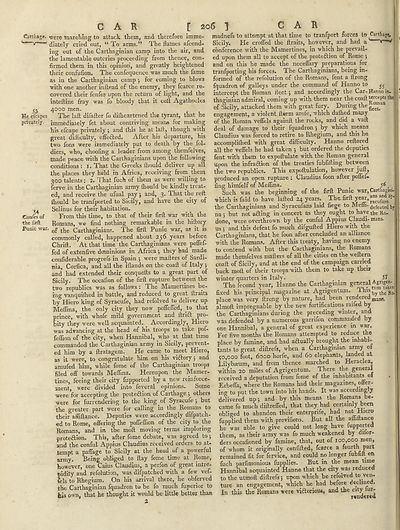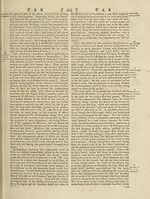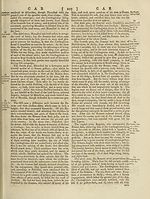Encyclopaedia Britannica, or, a Dictionary of arts, sciences, and miscellaneous literature : enlarged and improved. Illustrated with nearly six hundred engravings > Volume 5, BUR-CHI
(220) Page 206
Download files
Complete book:
Individual page:
Thumbnail gallery: Grid view | List view

C A K
[ 206 1
CAR
S3
He eicapes
privately.
Carthage, were tnarching to attack them, and therefore imme-
diately cried out, “ To arms.” The flames afeend-
ing out of the Carthaginian camp into the air, and
the lamentable outcries proceeding from thence, con¬
firmed them in this opinion, and greatly heightened
their confufion. The confequence was much the fame
as in the Carthaginian camp •, for coming to blows
with one another inftead of the enemy, they fcarce re¬
covered their fenfes upon the return of light, and the
inteftine fray was fo bloody that it coif Agathocles
4000 men.
The laif difailer fo diflieartened the tyrant, that he
immediately fet about contriving means for making
his efcape privately ; and this he at lafly though with
great difliculty, effe£ted. After his departure, his
two fons were immediately put to death by the fol-
diers, who, choofmg a leader from among themfelyes,
made peace with the Carthaginians upon the following
conditions : 1. That the Greeks ihould deliver up all
the places they held in Africa, receiving from them
300 talents: 2. That fuch of them as were willing to
ferve in the Carthaginian army fhould be kindly treat¬
ed, and receive the ufual pay $ and, 3. lhat the reft
fhould be tranfported to Sicily, and have the city of
Selinus for their habitation.
From this time, to that of their firft war with the
Romans, we find nothing remarkable in the hiftory
f unic war. ^ Carthaginians. The firft Punic war, as it is
commonly called, happened about 256 years before
Chrift. At that time the Carthaginians were poffef-
fed of extenfive dominions in Africa •, they had made
confiderable progrefs in S^ain $ were mailers of Sardi¬
nia, Corfica, and all the iflands on the coaft of Italy ;
and had extended their conquefts to a great part of
Sicily. The occafion of the firft rupture between the
two republics was as follows t The Mamertines be¬
ing vanquiihed in battle, and reduced to great ftraits
by Hiero king of Syracufe, had refolved to deliver up
Meflina, the only city they now poffeffed, to that
prince, with whofe mild government and drift pro¬
bity they were ■well acquainted. Accordingly, Hiero
was advancing at the head of his troops to take pof-
feflion of the city, when Hannibal, wlw at that time
commanded the Carthaginian army in Sicily, prevent¬
ed him by a ftratagem. He came to meet Hiero,
as it were, to congratulate him on his viftory *, and
amufed him, while fome of the Carthaginian troops
filed off towards Meflina. Hereupon the Mamer
54 r
Caufes of
the firft
madnefs to attempt at that time to tranfport forces t» Carthage
Sicily. Fie crofled the ftraits, however, and had a
conference with the Mamertines, in which he prevail¬
ed upon them all to accept of the proteftion of. Rome $
and on this he made the neceffary preparations for
tranfporting his forces. The Carthaginians, being in¬
formed of the refolution of the Romans, fent a ftrong
fquadron of galleys under the command of Hanno to ^
intercept the Roman fleet 5 and accordingly the Car-Hanno in.
thaginian admiral, coming up with them near the coaft te'cepts tlw
of Sicily, attacked them with great fury. During the
engagement, a violent fterm arofe, which dafhed many
of the Roman veffels againft the rocks, and did a vaft
deal of damage to their fquadron •, by which means
Claudius was forced to retire to Rhegium, and this he
accomplifhed with great difficulty. Hanno reftored
all the veffels he had taken } but ordered the deputies
fent with them to expoftulate with the Roman general
upon the infraftion of the treaties fubfifting between
the two republics. This expoftulation, however juft,
produced an open rupture ; Claudius foon after poll ef¬
fing himfelf of Meflina. 56 (
Such was the beginning of the firft Punic war, Carthagim.
which is faid to have lafted 24 years.. The firft year,“^
the Carthaginians and Syracufans laid fiege to Mefli- ^efeate(j
na but not afting in concert as they ought to have t},e k0.
done, were overthrown by the conful Appius Claudi- mans,
us; and this defeat fo much difgufted Hiero with the
Carthaginians, that he foon after concluded an alliance
with the Romans. After this treaty, having no enemy
to contend with but the Carthaginians, the Romans
made themfelves mailers of all the cities on the weftern
coaft of Sicily, and at the end of the campaign carried
back moft of their troops with them to take up their
winter quarters in Italy. # 57
Thefecond year, Hanno the Carthaginian general Agnge^
fixed his principal magazine at Agrigentum. ^ ^ by the Re¬
place was very ftrong by nature, had been rendered manj,
almoft impregnable by the new fortifications raifed by
the Carthaginians during the preceding winter, and
was defended by a numerous garrifon commanded by
one Hannibal, a general of great experience in war.
For five months the Romans attempted to reduce the
place by famine, and had aftually brought the inhabi¬
tants to great diftrefs, when a Carthaginian army of
50,000 foot, 6000 horfe, and 60 elephants, landed at
Lilybasum, and from thence marched to Heraclea,
wfithin 20 miles of Agrigentum. I here the general
filed off towards Medina. Hereupon me mamer- wiuun ^ . 1, nf
tines feeing their city fupported by a new reinforce- received a deputation from feme of. the inhabitants of
lines, leemg ui / ir' ^ F.rfipffa. where the Romans had their magazines, offer-
ment, were divided into" feveral opinions. Some
were for accepting the proteftion of Carthage } others
were for furrendering to the king of Syracufe 5 but
the greater part were for calling in the Romans to
their afliftance. Deputies were accordingly difpatch-
«d to Rome, offering the poffeffion of the city to the
Romans, and in the moft moving terms imploring
proteftion. This, after fome debate, was agreed to ^
and the conful Appius Claudius received orders to at¬
tempt a paffage to Sicily at the head of a powerful
army. Being obliged to ftay fome time at Rome,
however, one Cains Claudius, a perfon of great intre¬
pidity and refolution, was difpatched with a few vef¬
fels to Rhegium. On his arrival there, he obferved
the Carthaginian fquadron to be fo much fuperior to
hh own, that he thought it would be little better than
Erbeffa, where the Romans had their magazines, offer-
ing to put the town into his hands. It was accordingly
delivered up; and by this means the Romans be¬
came fo much diftreffed, that they had certainly been
obliged to abandon their enterprife, had not Hiero
fupplied them with provifions. But all the afliftance
he was able to give could not long have fupportea
them, as their army was fo much weakened by difor-
ders occafioned by famine, that, out of ioo,oco men,
of whom it originally cenfifted, fcarce a fourth part
remained fit for fervice, and could no longer fubfift oft
fuch parfimonious fupplies. But in the mean time
Hannibal acquainted Hanno that the city was reduced
to the utmoft diftrefs; upon which be refolved t0 vt”“’
lure an engagement, which he had before declined.
In this the Romans were viftorioue, and the city lur-
rendered
[ 206 1
CAR
S3
He eicapes
privately.
Carthage, were tnarching to attack them, and therefore imme-
diately cried out, “ To arms.” The flames afeend-
ing out of the Carthaginian camp into the air, and
the lamentable outcries proceeding from thence, con¬
firmed them in this opinion, and greatly heightened
their confufion. The confequence was much the fame
as in the Carthaginian camp •, for coming to blows
with one another inftead of the enemy, they fcarce re¬
covered their fenfes upon the return of light, and the
inteftine fray was fo bloody that it coif Agathocles
4000 men.
The laif difailer fo diflieartened the tyrant, that he
immediately fet about contriving means for making
his efcape privately ; and this he at lafly though with
great difliculty, effe£ted. After his departure, his
two fons were immediately put to death by the fol-
diers, who, choofmg a leader from among themfelyes,
made peace with the Carthaginians upon the following
conditions : 1. That the Greeks ihould deliver up all
the places they held in Africa, receiving from them
300 talents: 2. That fuch of them as were willing to
ferve in the Carthaginian army fhould be kindly treat¬
ed, and receive the ufual pay $ and, 3. lhat the reft
fhould be tranfported to Sicily, and have the city of
Selinus for their habitation.
From this time, to that of their firft war with the
Romans, we find nothing remarkable in the hiftory
f unic war. ^ Carthaginians. The firft Punic war, as it is
commonly called, happened about 256 years before
Chrift. At that time the Carthaginians were poffef-
fed of extenfive dominions in Africa •, they had made
confiderable progrefs in S^ain $ were mailers of Sardi¬
nia, Corfica, and all the iflands on the coaft of Italy ;
and had extended their conquefts to a great part of
Sicily. The occafion of the firft rupture between the
two republics was as follows t The Mamertines be¬
ing vanquiihed in battle, and reduced to great ftraits
by Hiero king of Syracufe, had refolved to deliver up
Meflina, the only city they now poffeffed, to that
prince, with whofe mild government and drift pro¬
bity they were ■well acquainted. Accordingly, Hiero
was advancing at the head of his troops to take pof-
feflion of the city, when Hannibal, wlw at that time
commanded the Carthaginian army in Sicily, prevent¬
ed him by a ftratagem. He came to meet Hiero,
as it were, to congratulate him on his viftory *, and
amufed him, while fome of the Carthaginian troops
filed off towards Meflina. Hereupon the Mamer
54 r
Caufes of
the firft
madnefs to attempt at that time to tranfport forces t» Carthage
Sicily. Fie crofled the ftraits, however, and had a
conference with the Mamertines, in which he prevail¬
ed upon them all to accept of the proteftion of. Rome $
and on this he made the neceffary preparations for
tranfporting his forces. The Carthaginians, being in¬
formed of the refolution of the Romans, fent a ftrong
fquadron of galleys under the command of Hanno to ^
intercept the Roman fleet 5 and accordingly the Car-Hanno in.
thaginian admiral, coming up with them near the coaft te'cepts tlw
of Sicily, attacked them with great fury. During the
engagement, a violent fterm arofe, which dafhed many
of the Roman veffels againft the rocks, and did a vaft
deal of damage to their fquadron •, by which means
Claudius was forced to retire to Rhegium, and this he
accomplifhed with great difficulty. Hanno reftored
all the veffels he had taken } but ordered the deputies
fent with them to expoftulate with the Roman general
upon the infraftion of the treaties fubfifting between
the two republics. This expoftulation, however juft,
produced an open rupture ; Claudius foon after poll ef¬
fing himfelf of Meflina. 56 (
Such was the beginning of the firft Punic war, Carthagim.
which is faid to have lafted 24 years.. The firft year,“^
the Carthaginians and Syracufans laid fiege to Mefli- ^efeate(j
na but not afting in concert as they ought to have t},e k0.
done, were overthrown by the conful Appius Claudi- mans,
us; and this defeat fo much difgufted Hiero with the
Carthaginians, that he foon after concluded an alliance
with the Romans. After this treaty, having no enemy
to contend with but the Carthaginians, the Romans
made themfelves mailers of all the cities on the weftern
coaft of Sicily, and at the end of the campaign carried
back moft of their troops with them to take up their
winter quarters in Italy. # 57
Thefecond year, Hanno the Carthaginian general Agnge^
fixed his principal magazine at Agrigentum. ^ ^ by the Re¬
place was very ftrong by nature, had been rendered manj,
almoft impregnable by the new fortifications raifed by
the Carthaginians during the preceding winter, and
was defended by a numerous garrifon commanded by
one Hannibal, a general of great experience in war.
For five months the Romans attempted to reduce the
place by famine, and had aftually brought the inhabi¬
tants to great diftrefs, when a Carthaginian army of
50,000 foot, 6000 horfe, and 60 elephants, landed at
Lilybasum, and from thence marched to Heraclea,
wfithin 20 miles of Agrigentum. I here the general
filed off towards Medina. Hereupon me mamer- wiuun ^ . 1, nf
tines feeing their city fupported by a new reinforce- received a deputation from feme of. the inhabitants of
lines, leemg ui / ir' ^ F.rfipffa. where the Romans had their magazines, offer-
ment, were divided into" feveral opinions. Some
were for accepting the proteftion of Carthage } others
were for furrendering to the king of Syracufe 5 but
the greater part were for calling in the Romans to
their afliftance. Deputies were accordingly difpatch-
«d to Rome, offering the poffeffion of the city to the
Romans, and in the moft moving terms imploring
proteftion. This, after fome debate, was agreed to ^
and the conful Appius Claudius received orders to at¬
tempt a paffage to Sicily at the head of a powerful
army. Being obliged to ftay fome time at Rome,
however, one Cains Claudius, a perfon of great intre¬
pidity and refolution, was difpatched with a few vef¬
fels to Rhegium. On his arrival there, he obferved
the Carthaginian fquadron to be fo much fuperior to
hh own, that he thought it would be little better than
Erbeffa, where the Romans had their magazines, offer-
ing to put the town into his hands. It was accordingly
delivered up; and by this means the Romans be¬
came fo much diftreffed, that they had certainly been
obliged to abandon their enterprife, had not Hiero
fupplied them with provifions. But all the afliftance
he was able to give could not long have fupportea
them, as their army was fo much weakened by difor-
ders occafioned by famine, that, out of ioo,oco men,
of whom it originally cenfifted, fcarce a fourth part
remained fit for fervice, and could no longer fubfift oft
fuch parfimonious fupplies. But in the mean time
Hannibal acquainted Hanno that the city was reduced
to the utmoft diftrefs; upon which be refolved t0 vt”“’
lure an engagement, which he had before declined.
In this the Romans were viftorioue, and the city lur-
rendered
Set display mode to:
![]() Universal Viewer |
Universal Viewer | ![]() Mirador |
Large image | Transcription
Mirador |
Large image | Transcription
Images and transcriptions on this page, including medium image downloads, may be used under the Creative Commons Attribution 4.0 International Licence unless otherwise stated. ![]()
| Permanent URL | https://digital.nls.uk/192987129 |
|---|
| Attribution and copyright: |
|
|---|
| Description | Ten editions of 'Encyclopaedia Britannica', issued from 1768-1903, in 231 volumes. Originally issued in 100 weekly parts (3 volumes) between 1768 and 1771 by publishers: Colin Macfarquhar and Andrew Bell (Edinburgh); editor: William Smellie: engraver: Andrew Bell. Expanded editions in the 19th century featured more volumes and contributions from leading experts in their fields. Managed and published in Edinburgh up to the 9th edition (25 volumes, from 1875-1889); the 10th edition (1902-1903) re-issued the 9th edition, with 11 supplementary volumes. |
|---|---|
| Additional NLS resources: |
|

